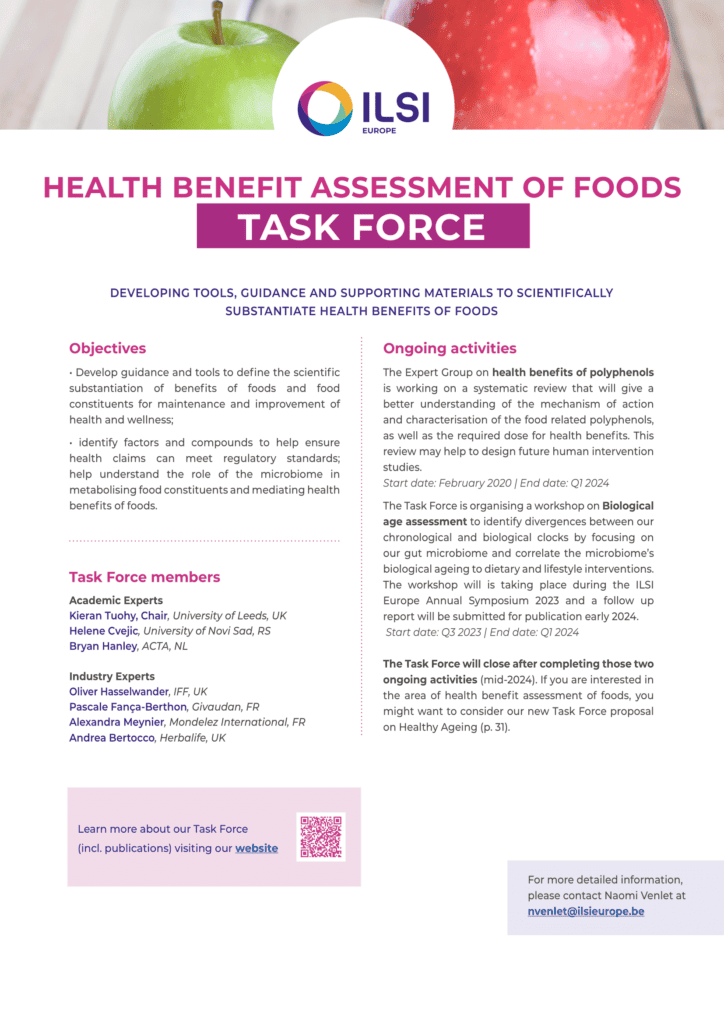Developing tools, guidance and supporting materials to scientifically substantiate health benefits of foods
Task Force Information
Objectives
• Develop guidance and tools to define the scientific substantiation of benefits of foods and food constituents for maintenance and improvement of health and wellness;
• identify factors and compounds to help ensure health claims can meet regulatory standards; help understand the role of the microbiome in metabolising food constituents and mediating health benefits of foods.
Task Force Members
| Kieran Tuohy - Chair | University of Leeds | Professor | UK |
| Helene Cvejic | University of Novi Sad | Full Professor | RS |
| Bryan Hanley | ACTA | Visiting Researcher | NL |
| Oliver Hasselwander | IFF | Scouting & Development Leader | UK |
| Pascale Fança-Berthon | Givaudan | Category Technical Leader | FR |
| Alexandra Meynier | Mondelez International, | Nutrition Scientist | FR |
| Andrea Bertocco | Herbalife | Scientific Affairs Director | UK |
| Naomi Venlet | ILSI Europe | Scientific Project Manager | BE |
Contact Information
For more detailed information, please contact Naomi Venlet at nvenlet@ilsieurope.be
Activity Overview
Ongoing
- Health benefits of polyphenols
The Expert Group is working on a systematic review that will give a better understanding of the mechanism of action and characterisation of the food related polyphenols, as well as the required dose for health benefits. This review may help to design future human intervention studies.
Start date: February 2020 | End date: Q1 2024
- Biological age assessment: are you as old as your gut says you are?
The Task Force is organising a workshop to identify divergences between our chronological and biological clocks by focusing on our gut microbiome and correlate the microbiome’s biological ageing to dietary and lifestyle interventions. The workshop will is taking place during the ILSI Europe Annual Symposium 2023 and a follow up report will be submitted for publication early 2024.
Start date: Q3 2023 | End date: Q1 2024
The Task Force will close after completing those two ongoing activities.
Expert Groups
Health benefits of polyphenols
Background and Objectives
Polyphenol consumption (present in dark berries, cocoa, nuts and others) has been associated with several cardiometabolic and cognitive function benefits. However, the mechanism of action is often not fully understood. The objective is to better understand this mechanism, investigating the effects of consumption of food related polyphenols and microbial polyphenol-derived metabolites on the gut microbiome and associated health benefits.
Output
The resulting systematic review will give a better understanding of the mechanism of action and characterization of the food related polyphenols, as well as the required dose for health benefits. This review may help to design future human intervention studies.
Expert Group Members
| Kieran Tuohy | University of Leeds | Professor | UK |
| Jessica van Harsselaar - Vice-Chair | Südzucker Group | Manager Nutrition Science | DE |
| Wafa Alotaibi | King's College London | PhD Student | UK |
| Letizia Bresciani | University of Parma | Post-doc Student | IT |
| Jelena Helene Cvejic | University of Novi Sad | Professor | RS |
| Daniele Del Rio | University of Parma | Professor | IT |
| Pascale Fança-Berthon | Naturex (Givaudan) | Category Technical Leader | FR |
| Oliver Hasselwander | IFF | Technical Fellow | UK |
| Qiqiong Li | University of Gent | PhD Student | BE |
| Claudine Manach | INRAE | Professor | FR |
| Alexandra Meynier | Mondelēz International | Nutrition Scientist | FR |
| Laurent-Emmanuel Montfoulet | INRAE | Researcher | FR |
| Ana Rodriguez-Mateos | King's College London | Lecturer in Nutrition | UK |
| Darija Sazdanic | University of Novi Sad | Teaching Assistant | RS |
| Tom van de Wiele | University of Gent | Professor | BE |
| Naomi Venlet | ILSI Europe | Scientific Project Manager | BE |
Background and objectives
The interactive workshop aims to address the key questions, limitations and challenges on biological ageing in the context of the gut microbiota and its role in immunosenescence.
Objectives:
1. To identify the relationship of biological ageing and gut microbiota
2. What is the impact of the ageing gut microbiota on immunity?
3. How can we counteract the adverse effects of biological ageing, focussing on diet, and physical activity?
Speakers and Participanting Experts
- Bryan Hanley, Academic Centre for Dentistry
Amsterdam (ACTA), NL - Miguel Gueimonde, Spanish National Research
Council, ES - Sonia Gonzalez, Universidad de Oviedo, ES
- Philip Calder, University of Southampton, UK
- Helene Jelena Cvejic, University of Novi Sad, RS
- Isabelle Savary-Auzeloux, Human Nutrition Unit
INRAE, FR
Organising Committee
- Andrea Bertocco, Herbalife, UK
- Helene Jelena Cvejic, University of Novi Sad, SRB
- Kieran Tuohy, Fondazione Edmund Mach, UK
- Bryan Hanley, ACTA, NL
Publications
Monographs
Antioxidant and Anti-Inflammatory Components of Foods
2015
Multimedia
Completed Expert Groups
Overview of completed activities
- Review of the Evidence Base for Population Targeted Protein Intake for Muscle Health
- Identifying preferred approaches for quantifying the impact of modifying nutrient intakes
- Joint nutrition cluster activity on ‘mechanistic insights into the gut-brain axis' in collaboration with Early Nutrition and Long-Term Health; Nutrition, Immunity & Inflammation; Nutrition & Brain Health; Prebiotics and Probiotics Task Forces

